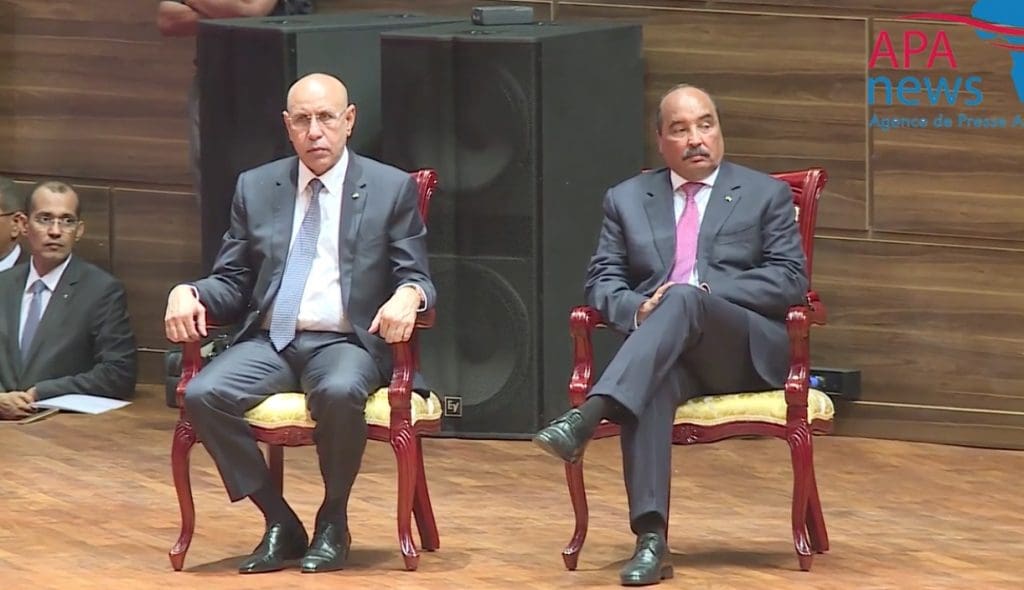Mauritania’s 59th year of independence which fell on November 28 was heavily overshadowed by signs of a rift between current President Mohamed Ould Cheikh Ghazouani and his predecessor Mohamed Ould Abdelaziz.
By Mohamed Moctar
Relations between the two former allies have deteriorated further, fueling animated public discourses.
A divorce between an estranged couple could not have presented a more acrimonious spectacle.
Tongues have been wagging in Mauritania in recent days about a split between the new president and his predecessor which culminated in a spectacular rupture while the lifting of the national colors during Independence Day celebrations in Akjoujt (260 kilometers east of Nouakchott) was taking place.
Officially invited as a former head of state, in line with the country’s tradition, Mohamed Ould Abdelaziz preferred to snub the event.
It was the first public event organized by Mohamed Ould Sheikh El Ghazouani, Aziz’s “friend of 40 years,”, who succeeded him in power about three months ago.
The seat reserved for him on the official stands remained empty, unlike those of Mohamed Khouna Ould Haidalla and Sidi Mohamed Ould Sheikh Abdallahi, the only former presidents still alive.
The split between the two former army generals and co-perpetrators of several coups, including the one that initially installed Aziz in power in 2008, began with the return of the latter in Mauritania, after a long stay abroad he started in the early hours following the swearing-in of Ghazouani in August.
Upon his arrival, the former head of state convened and chaired an extraordinary meeting of the interim management committee of the ruling Union for the Republic (UPR).
During that meeting, Aziz formally declared that he was the unique reference of UPR, a party he founded and led during his years in power (2008 – 2019).
This statement had irked Ghazouani who, in turn, convened a similar management committee to claim that he was the one and only reference point for the party, urging it to spare his ex-friend.
Following this call to order, almost all members of the presidential majority turned their backs on Aziz and rallied behind President Ghazouani.
But they had somewhat underestimated the stubbornness of the former president who immediately summoned the leaders of the youth and women’s wings of the party.
He told them that he still considered himself the leader of the ruling party, even if he had to remain its sole member.
UPR initially had to organize a congress to elect its new leadership before the presidential elections, but ended up deferring it indefinitely.
This had formed the basis for the former president to always claims leadership of the party, since he was the one who appointed its current management committee.
He was wont to remind his former friend turned foe that the Mauritanian constitution forbids any sitting president to join any political party.
“The man had ruled the country with an iron fist for too long and would not come to terms with the reality of becoming an ordinary citizen like everyone else,” said Sidi Yahya Ould Cheikh, a political analyst in Nouakchott.
“But he was wrong in forgetting that the Mauritanian political class was unstable and could change sides every time a new leader takes the reins” he told APA Thursday in Nouakchott.
The political analyst said the question that now arises is how far Ould Abdel Aziz will go in his provocative stance against his friend-cum foe.
“Personally, I think he may be wrong a second time, if he continues to believe that Ghazouani will indefinitely tolerate his counterproductive actions,” Ould Cheikh concluded.
In a move considered by observers as a logical continuation of the breakup between the two men, Ould Ghazouani dismissed the commander of the presidential security battalion on Wednesday, November 27, and replaced him with one of his close officers.
Moo/Dng/fss/as/APA


